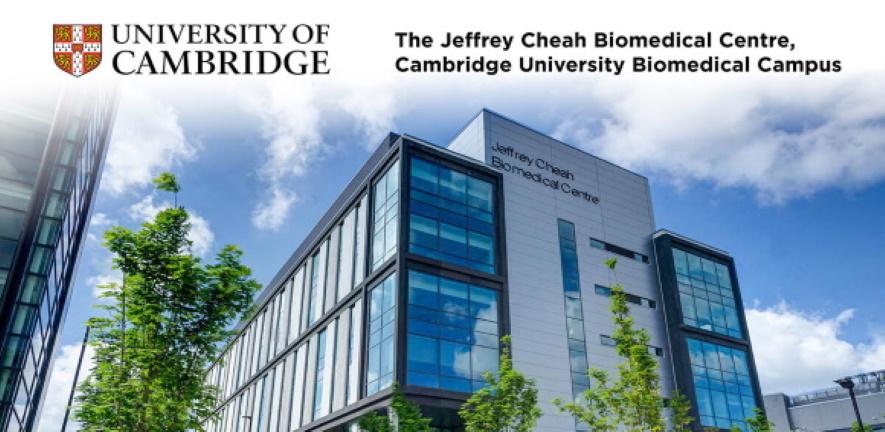
Jeffrey Cheah Biomedical Centre (JCBC) and CITIID
Just six minutes south of University of Cambridge‘s main campus sits the newly named Jeffrey Cheah Biomedical Centre (JCBC) (previously known as Project Capella) with its modern exteriors and accentuated panel windows.
The Jeffrey Cheah Biomedical Centre (JCBC) is a recent addition to the Cambridge Biomedical Campus, the largest biotech cluster outside the United States. The six storey 18,000 square metre building is situated in a group of state-of-the-art laboratories and hospitals including the world famous Laboratory of Molecular Biology (16 Nobel Prizes), the Royal Papworth Hospital – the most illustrious Heart and Lung Hospital in Europe, and the renowned Addenbrooke’s Hospital. The building's immediate next door neighbour is CRUK’s Cambridge Institute, and it lies just a few minutes walk from the new £500million-plus global HQ and R&D centre being built for AstraZeneca on Cambridge Biomedical Campus.
The JCBC is now occupied, and is home to the Cambridge Stem Cell Institute (led by Professor Tony Green), the Milner Therapeutics Institute (led by Tony Kouzarides), and joined by the new AstraZeneca-Cancer Research UK Functional Genomics Centre, the group of Manav Pathania of the Department of Oncology, and Kathryn Lilley and her team at the Cambridge Centre for Proteomics), and finally the Cambridge Institute for Therapeutic Immunology and Infectious Disease (CITIID) (led by Professor Ken Smith of the Department of Medicine). The last two laboratories have a district translational focus, and will hasten the transfer of fundamental research results to the clinic. Ultimately, the Centre will allow industry-academic interaction in a single location to create enable new collaborations in areas of therapeutic priority.
In addition to state-of-the-art research facilities the building contains also houses a café, seminar room and exhibition space for events.
CITIID
The Cambridge Institute for Therapeutic Immunology and Infectious Disease (CITIID) was established by the Department of Medicine to support both fundamental and translational research on human disease. Infectious disease, antimicrobial resistance and autoimmunity are three of humanity’s deadliest foes and a major global challenge. Cambridge is one of the world’s leading research universities, working across disciplines with international partners to find solutions to global these challenges. Many Cambridge Infectious Diseases members are housed together at CITIID. With researchers working directly in countries throughout the globe, we have a very real understanding of the impact diseases have on patients.
CITIID houses up to 250 scientists working within 25 research groups. The Institute’s work focusses on understanding the pathogenesis and improving the management of immune-related disorders and transforming our understanding of how the infectious agents interact with humans.
CITIID transforms immunity and infection research in Cambridge by providing researchers with advanced facilities that are in close proximity and enable them to optimise their work on human immune, inflammatory and infectious diseases. By bringing together its clinical capabilities and key industry partners, CITIID is also well-placed to drive therapeutic breakthroughs, improve patient outcomes and advance population health both in the UK and abroad.
Click here to find out who is based in the building. To view services and administrative contacts at the centre click here
Follow this link to download a PDF of statistics about the Cambridge biomedical cluster:

